Media failed to flag HB 78: Semantics flouts Constitution

SHOULD HOUSE Bill 78 become law, it will amend the 84-year old Public Service Act to strictly define and differentiate between “public service” and “public utility.” The 1987 Constitution stipulates that “public utilities” must be at least 60% Filipino-owned.
HB 78 has gone through five months of deliberation. It went to the third and final reading last March 10. Only the distribution and transmission of electricity, and water pipeline distribution and sewerage pipeline systems are retained as “public utilities.” Transportation, power and telecommunications are now considered “public services,” allowing foreigners to own 100% of such businesses. The bill assigns to the NEDA and the Philippine Competition Commission the task of recommending to Congress a re-classification of a public service entity to a public utility.
Discussion of the issue of foreign ownership has always used the two terms— public utility and public service — interchangeably. The separate application of the two terms is obviously an attempt to go around the Constitutional restriction on foreign ownership of vital services.
News coverage of this highly controversial development suggests that media may have missed the crucial point, as there was little discussion of what the bill intends to do.
CMFR monitored the coverage of six Manila-based broadsheets (Philippine Daily Inquirer, Philippine Star, Manila Bulletin, Manila Standard, The Manila Times and Daily Tribune) and four primetime news programs (ABS-CBN 2’s TV Patrol, GMA-7’s 24 Oras, TV5’s Aksyon and CNN Philippines’ News Night) and selected news sites in February and March 2020.
Reports did not give the bill the prominence that its contentious issues deserve. The news landed only in the inside pages of newspapers. On TV, the story did not lead in the primetime newscasts. Discussion was limited to the points presented by proponents and opponents of the bill in the House: those who argued that a more liberal policy on foreign investments in these areas would be good for the economy, and those who saw the measure as unconstitutional.
In February, reports on the bill’s approval on second reading enumerated what entities are public utilities and public services. Only TV5’s Aksyon made the relevant observation of fact that the Constitution itself prohibits less than 60% Filipino ownership of public utilities.
What about mass media, which are currently limited to Filipino owners? ABS-CBN’s TV Patrol and GMA’s 24 Oras referred to the statement of Rep. Sharon Garin, principal author, that the bill does not cover mass media. The text of the bill exempts “radio companies, except with respect to the fixing of rates.” This particular provision is vague and confusing, but the media did not pursue this point.
TV Patrol went beyond House sources to interview two law professors in UP, who said lawmakers’ concerns over foreign control of telecommunications, and by extension mass media and its content, are not unfounded. But aside from quoting a brief reference to national security, the report did not elaborate on the professors’ views.
TV news no longer provided updates on the bill when it went on its third reading and final approval. In print, the Philippine Daily Inquirer, Manila Times and Manila Standard ran stories with the tally of votes, but added nothing new.
Unfortunately, these articles did not carry any further discussion on the constitutional issue, nor any of the concerns from sources outside the House over the unlimited entry of foreign owners in some of these businesses.
No report discussed the economic, legal and political implications of this bill once it is passed into law. Some online accounts said a counterpart bill is pending at the committee level in the Senate, but journalists did not follow up to ask senators about it. Neither did reports seek the views of any senator about the passage of the House bill.
Op-ed provides context
Opinion pieces did more to reflect the gravity of the issue. In their March columns in the Inquirer, retired Supreme Court Justice Antonio Carpio and economics professor Winnie Monsod both focused on the bill’s circumvention of the Constitution. Carpio raised thealarm over Congress’ taking over the Supreme Court’s duty to interpret the Charter. Monsod pointed out that the lawmakers pushing for the bill gave no solid evidence to back their assertions that easing restrictions would surely invite more foreign investments.
Carpio followed up with an op-ed last June 4 in which he said that telecommunications companies utilize radio frequencies, a natural resource owned by the state. Therefore, they must comply with the 60-40 equity ratio.
Beyond constitutional concerns, economist JC Punongbayan cited the basis for alarm over unrestricted foreign involvement. In a Rappler op-ed earlier published February 20, he cited China’s current involvement in Philippine telecommunications and power through Dito Telecommunity and the NGCP, and discussed the security risks posed by both arrangements.
The startling blank in the coverage was the failure to cite China’s interest, and how such larger participation in these areas would embolden Beijing as it continues to encroach in the West Philippine Sea.
Is the bill opening the door to the further entry of Chinese groups into certain businesses? Unfortunately, it was a question that the media were not prepared to ask. And yet, as public opinion polls indicate, this would be a major concern among Filipinos. Journalists failed to break through the surface and tell the people what this legislation is attempting to do.
Leave a Reply